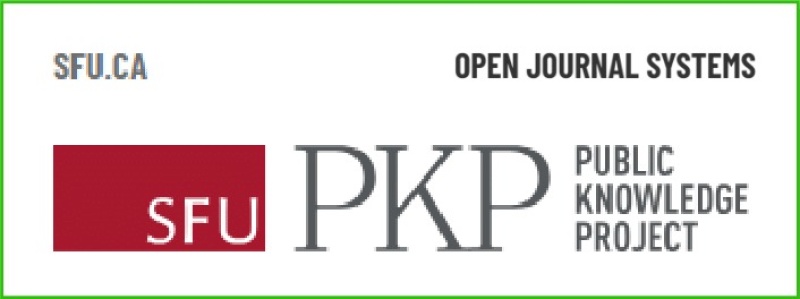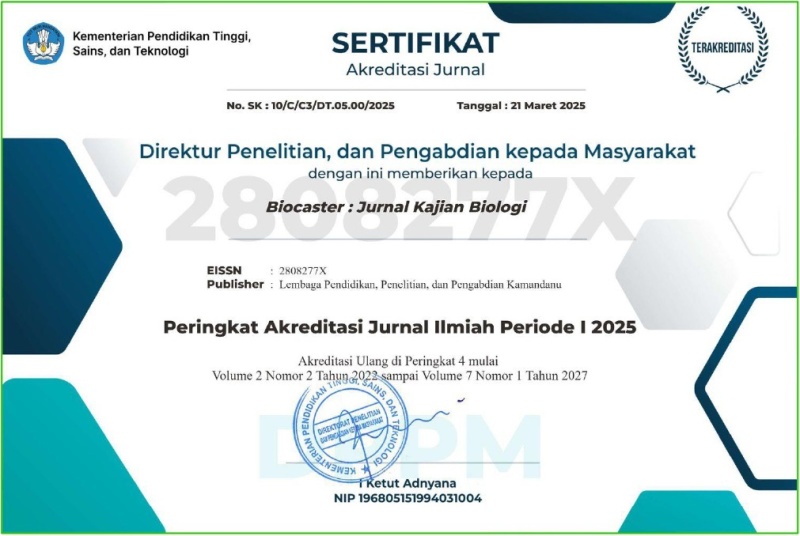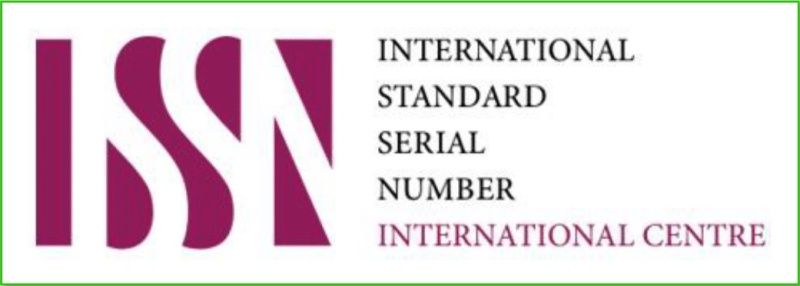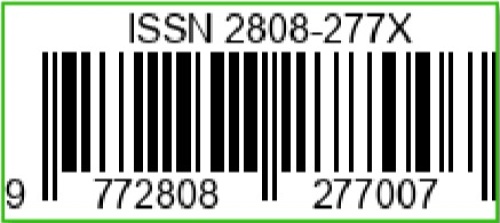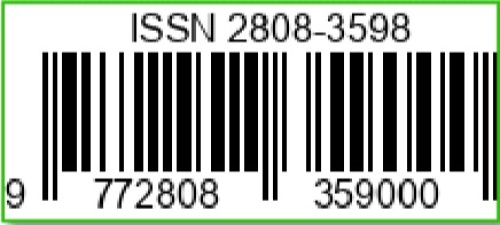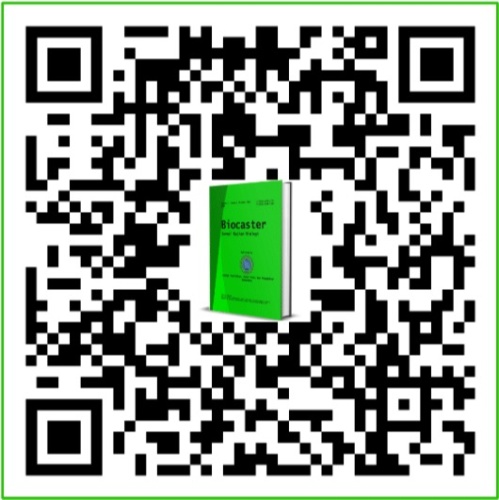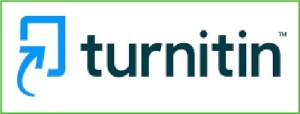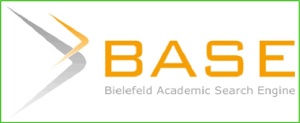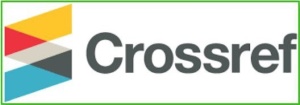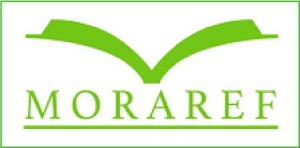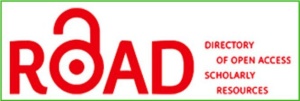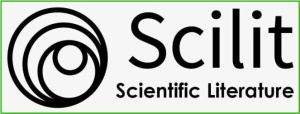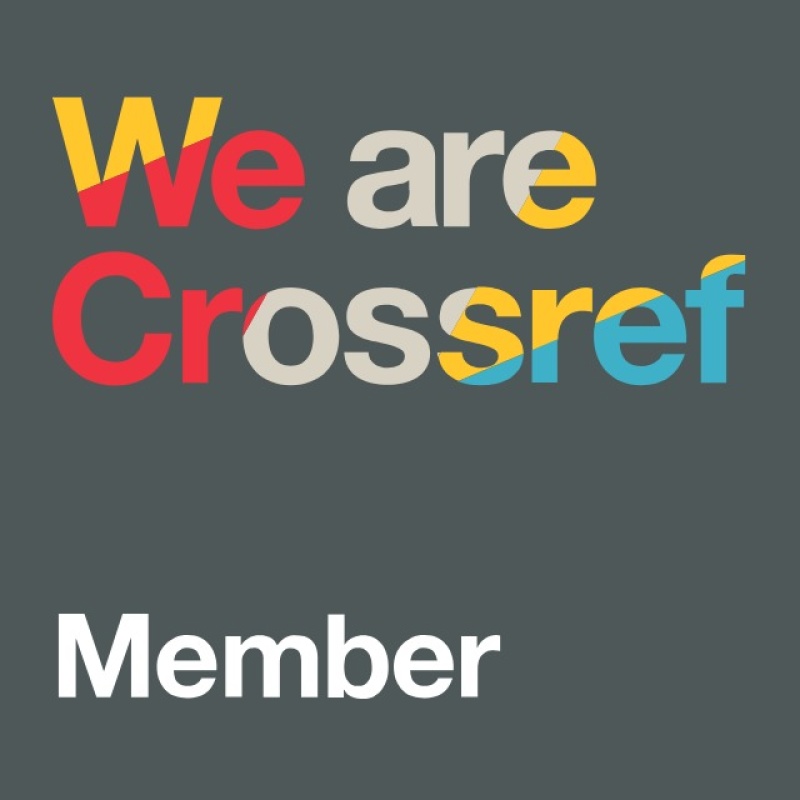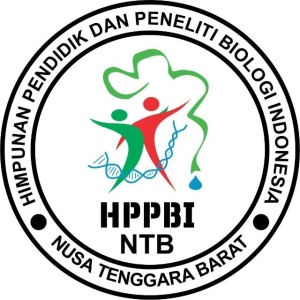Pengaruh Model Pembelajaran Guided Inquiry Berbantuan Virtual Laboratory terhadap Keterampilan Berpikir Kritis Peserta Didik
DOI:
https://doi.org/10.36312/biocaster.v5i3.441Keywords:
Guided Inquiry, Critical Thinking Skills, PhET, Virtual LaboratoryAbstract
This study aims to determine the effect of guided inquiry learning model assisted by virtual laboratory on students' critical thinking skills. The background of this study is based on the low critical thinking skills of students, as well as the limited laboratory facilities in schools. This study uses a quantitative model with a quasi-experimental design type pretest-posttest control group design. The research sample consisted of two classes X at SMA Negeri 2 Labuapi which were selected by cluster random sampling. The research instrument was a critical thinking skills test compiled based on Ennis' indicators (2011). Data analysis was carried out using the N-Gain test and ANCOVA test. The results showed that the N-Gain value of the experimental class (0.378) was higher than the control class (0.302), and the results of the ANCOVA test showed a significance value of 0.026 (<0.05) which means that there is a significant effect of the learning model on improving critical thinking skills. These findings indicate that the guided inquiry model assisted by virtual laboratory is more effective than conventional learning in developing critical thinking skills, such as the ability to analyze information, formulate arguments, and draw logical conclusions. This model is relevant to be applied in 21st century science learning, especially in schools with limited laboratory facilities.
Downloads
References
Anggraini, N., Suana, W., & Sesunan, F. (2020). Pengaruh Penerapan Blended Learning pada Materi Hukum Newton tentang Gerak terhadap Motivasi Belajar dan Kemampuan Pemecahan Masalah. Tarbawi : Jurnal Ilmu Pendidikan, 16(1), 22-36. https://doi.org/10.32939/tarbawi.v16i01.520
Anisa, A. R., Ipungkarti, A. A., & Saffanah, K. N. (2021). Pengaruh Kurangnya Literasi serta Kemampuan dalam Berpikir Kritis yang Masih Rendah dalam Pendidikan di Indonesia. Current Research in Education : Conference Series Journal, 1(1), 1-12.
Azra, K. I. Y., & Nurita, T. (2025). Penerapan Pembelajaran Inkuiri Terbimbing pada Siswa SMP untuk Meningkatkan Keterampilan Berpikir Kritis Materi Kalor. Biochephy : Journal of Science Education, 5(1), 302-308. https://doi.org/10.52562/biochephy.v5i1.1478
Basyori, S. I. (2025). Peranan Guru sebagai Fasilitator dalam Dunia Pendidikan Modern. Syntax Idea, 7(4), 559-564. https://doi.org/10.46799/syntaxidea.v7i4.12827
Chotimah, A. N., Setyawarno, D., & Rosana, D. (2023). Effect of Guided Inquiry Model by PhET Simulations Worksheet on Science Process Skills and Mastery of Concepts. Journal of Science Education Research, 7(2), 100-105. https://doi.org/10.21831/jser.v7i2.63953
Cohen, L., Manion, L., & Morrison, K. (20018). Research Methods in Education (8th Ed.). Oxfordshire: Routledge Taylor and Francis Group.
Defianti, A., Hamdani, D., & Syarkowi, A. (2021). Penerapan Metode Praktikum Virtual Berbasis Simulasi PhET Berbantuan Guided-Inquiry Module untuk Meningkatkan Pengetahuan Konten Fisika. Jurnal Pendidikan Fisika Undiksha, 11(1), 47-55. https://doi.org/10.23887/jjpf.v11i1.33288
Ennis, R. H. (2011). The Nature of Critical Thinking : An Outline of Critical Thinking Dispositions and Abilities. Campaign: University of Illinois.
Fatimah, Z., Rizaldi, D. R., Jufri, A. W., & Jamaluddin, J. (2020). Model Inkuiri Terbimbing Berbantuan Laboratorium Virtual untuk Meningkatkan Keterampilan Proses Sains. Jurnal Pendidikan, Sains, Geologi, dan Geofisika, 1(2), 28-32. https://doi.org/10.29303/goescienceedu.v1i2.45
Gunawan, G., Harjono, A., Hermansyah, H., & Herayanti, L. (2019). Guided Inquiry Model through Virtual Laboratory to Enhance Students’ Science Process Skills on Heat Concept. Jurnal Cakrawala Pendidikan, 38(2), 259-268. https://doi.org/10.21831/cp.v38i2.23345
Hermansyah, H., Gunawan, G., Harjono, A., & Adawiyah, R. (2019). Guided Inquiry Model with Virtual Labs to Improve Students’ Understanding on Heat Concept. Journal of Physics : Conference Series, 1153(1), 1-5. https://doi.org/10.1088/1742-6596/1153/1/012116
Khaeruddin, K. (2017). Model Pembelajaran Fisika Berbasis Keterampilan Proses Sains untuk Meningkatkan Keterampilan Berpikir Kritis Siswa SMA. Disertasi. Universitas Negeri Surabaya.
Kotsis, K. T. (2024). Significance of Experiments in Inquiry-Based Science Teaching. European Journal of Education and Pedagogy, 5(2), 86-92. https://doi.org/10.24018/ejedu.2024.5.2.815
Mardiyanti, N. E. A., & Jatmiko, B. (2022). Keefektifan Pembelajaran Fisika dengan Model Inkuiri Terbimbing Berbantuan PhET Interactive Simulations untuk Meningkatkan Kemampuan Berfikir Kritis Siswa SMA. Jurnal Ilmiah Pendidikan Fisika, 6(2), 327-336. https://doi.org/10.20527/jipf.v6i2.5281
Marina, D., Marwanti, K., & Astra, I. M. (2024). Improving Critical Thinking Using a Guided Inquiry Approach Assisted by PhET Simulations in Wave Material. Jurnal Penelitian Pembelajaran Fisika, 15(4), 367-371. https://doi.org/10.26877/jp2f.v15i4.717
Mursali, S., Hastuti, U. S., Zubaidah, S., & Rohman, F. (2023). Development of a Moodle-Assisted Guided Inquiry Model for General Biology E-Learning to Enhance the Student’ Critical Thinking Dispositions. Jurnal Penelitian Pendidikan IPA, 9(Special Issue), 280-291. https://doi.org/10.29303/jppipa.v9ispecialissue.6282
Mursali, S., Hastuti, U. S., Zubaidah, S., & Rohman, F. (2024). Guided Inquiry with Moodle to Improve Students’ Science Process Skills and Conceptual Understanding. International Journal of Evaluation and Research in Education, 13(3), 1875-1884. https://doi.org/10.11591/ijere.v13i3.27617
Rahayu, W., Tazkiyah, E., Murtadho, N., & Arifin, S. (2023). The Role of Teacher Ethics in Developing Student Character in School. Jurnal Ilmiah Sekolah Dasar, 7(3), 546-557. https://doi.org/10.23887/jisd.v7i3.55245
Rasyidah, K., Supeno, S., & Maryani, M. (2018). Pengaruh Guided Inquiry Berbantu PhET Simulations. Jurnal Pembelajaran Fisika, 7(2), 129-134. https://doi.org/10.19184/jpf.v7i2.7918
Riana, Y. J. (2024). Studi Meta Analisis: Model Guided Inquiry terhadap Berpikir Kritis. Diploma Thesis. UIN Raden Intan Lampung.
Rizka, R., Niko, N., Husaini, H., Ihsan, I., & Arlina, A. (2025). Implementasi Strategi Pembelajaran Problem Based Learning pada Mata Pelajaran Akidah Akhlak di SMP Swasta IT Ikhwanul Muslimin. Analysisn : Journal of Education, 3(1), 1-10.
Rosmalinda, N., Syahbana, A., & Nopriyanti, T. D. (2021). Analisis Kemampuan Berpikir Kritis Siswa SMP dalam Menyelesaikan Soal-soal Tipe PISA. Transformasi : Jurnal Pendidikan Matematika dan Matematika, 5(1), 483-496. https://doi.org/10.36526/tr.v5i1.1185
Rukminingsih, R., Adnan, G., & Latief, M. A. (2020). Metode Penelitian Pendidikan: Penelitian Kuantitatif, Penelitian Kualitatif, Penelitian Tindakan Kelas. Yogyakarta: Erhaka Utama.
Sa’adah, M., Suryaningsih, S., & Muslim, B. (2020). Pemanfaatan Multimedia Interaktif pada Materi Hidrokarbon untuk Menumbuhkan Keterampilan Berpikir Kritis Siswa. Jurnal Inovasi Pendidikan IPA, 6(2), 184-194. https://doi.org/10.21831/jipi.v6i2.29680
Safrida, L. N., Ambarwati, R., Adawiyah, R., & Albirri, E. R. (2018). Analisis Kemampuan Berpikir Kritis Mahasiswa Program Studi Pendidikan Matematika. Edu-Mat : Jurnal Pendidikan Matematika, 6(1), 10-16. https://doi.org/10.20527/edumat.v6i1.5095
Saleh, F. M., Riandi, R., & Surtikanti, H. K. (2024). Laboratorium Konvensional VS Laboratorium Virtual dalam Efektivitas dan Motivasi Pembelajaran Biologi: Studi Literatur. Jurnal Jeumpa, 11(1), 13-24. https://doi.org/10.33059/jj.v11i1.9143
Sartini, S., & Mulyono, R. (2022). Analisis Implementasi Kurikulum Merdeka Belajar untuk Mempersiapkan Pembelajaran Abad 21. Didaktik : Jurnal Ilmiah PGSD STKIP Subang, 8(2), 1348-1363. https://doi.org/10.36989/didaktik.v8i2.392
Simbolon, D. H. (2015). Pengaruh Model Pembelajaran Inkuiri Terbimbing Berbasis Eksperimen Riil dan Laboratorium Virtual terhadap Hasil Belajar Fisika Siswa. Jurnal Pendidikan dan Kebudayaan, 21(3), 299-316. https://doi.org/10.24832/jpnk.v21i3.192
Siskayanti, W. D., Nurhidayati, S., & Safnowandi, S. (2022). Pengaruh Model Problem Based Instruction Dipadu dengan Teknik Probing Prompting terhadap Kemampuan Berpikir Kritis dan Hasil Belajar Kognitif. Panthera : Jurnal Ilmiah Pendidikan Sains dan Terapan, 2(2), 94-112. https://doi.org/10.36312/pjipst.v2i2.76
Soraya, A. N., & Handayani, S., & Sucipto, S. (2024). Pengaruh Keterampilan Critical Thinking, Communication, Collaboration, and Creativity (4C) terhadap Hasil Belajar Siswa pada Penerapan Model Pembelajaran Project Based Learning (PjBL) Elemen Produk Kreatif dan Kewirausahaan di SMK Negeri 2 Kendal. Scaffolding, 13(2), 45-56. https://doi.org/10.15294/scaffolding.v13i2.7774
Utami, P. R., Rahmawati, L., & Noktaria, M. (2025). Pengembangan Kompetensi dan Soft Skill dalam Implementasi Kurikulum Merdeka : Tinjauan Literatur. Manajerial : Jurnal Inovasi Manajemen dan Supervisi Pendidikan, 5(1), 55-65. https://doi.org/10.51878/manajerial.v5i1.4734
Wulansari, F. W., & Dewi, N. R. (2022). Development of Guided Inquiry Learning Tools Using Socio-Scientific Issue to Train Critical Thinking Ability and Care for the Environment of Students. Journal of Environmental and Science Education, 2(1), 7-19. https://doi.org/10.15294/jese.v2i1.50465
Yulianti, E., Zhafirah, N. N., & Hidayat, N. (2021). Exploring Guided Inquiry Learning with PhET Simulation to Train Junior High School Students Think Critically. Berkala Ilmiah Pendidikan Fisika, 9(1), 96-104. https://doi.org/10.20527/bipf.v9i1.9617
Downloads
Published
How to Cite
Issue
Section
License
Copyright (c) 2025 Wulandari, Saidil Mursali, & Ika Nurani Dewi

This work is licensed under a Creative Commons Attribution-ShareAlike 4.0 International License.
-
Attribution — You must give appropriate credit, provide a link to the license, and indicate if changes were made. You may do so in any reasonable manner, but not in any way that suggests the licensor endorses you or your use.
-
ShareAlike — If you remix, transform, or build upon the material, you must distribute your contributions under the same license as the original.


